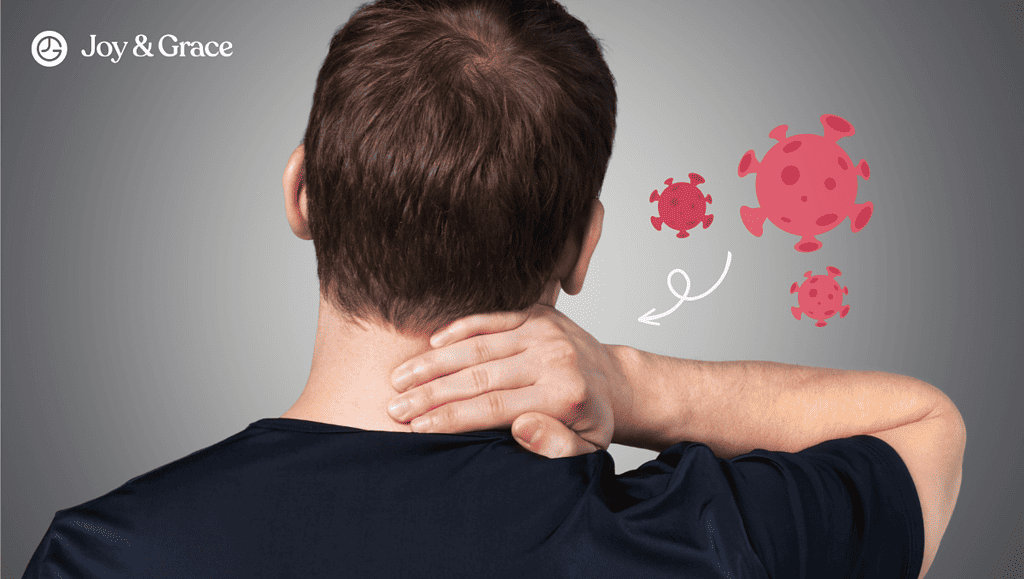Pregnancy is a unique period in a woman’s life. It is a time in which a woman’s body experiences changes. You have probably heard about many of these or even had them yourself at one point. But some changes, like shoulder pain, may seem totally unrelated.
How could pregnancy possibly affect the shoulder anyway? Let us read along to find out! This article will answer your questions and tell you all you need to know about the relationship between shoulder pain and pregnancy.
Can Pregnancy Cause Shoulder Pain?
Simply put, yes. Carrying a baby is one of the most rewarding experiences you can go through as a parent. But as much as the experience may be rewarding, it can come with physical pain. One of the results of the changes that happen during pregnancy is shoulder pain.
Pregnancy, as a whole, normally lasts about 40 weeks and can be separated into three stages called trimesters:
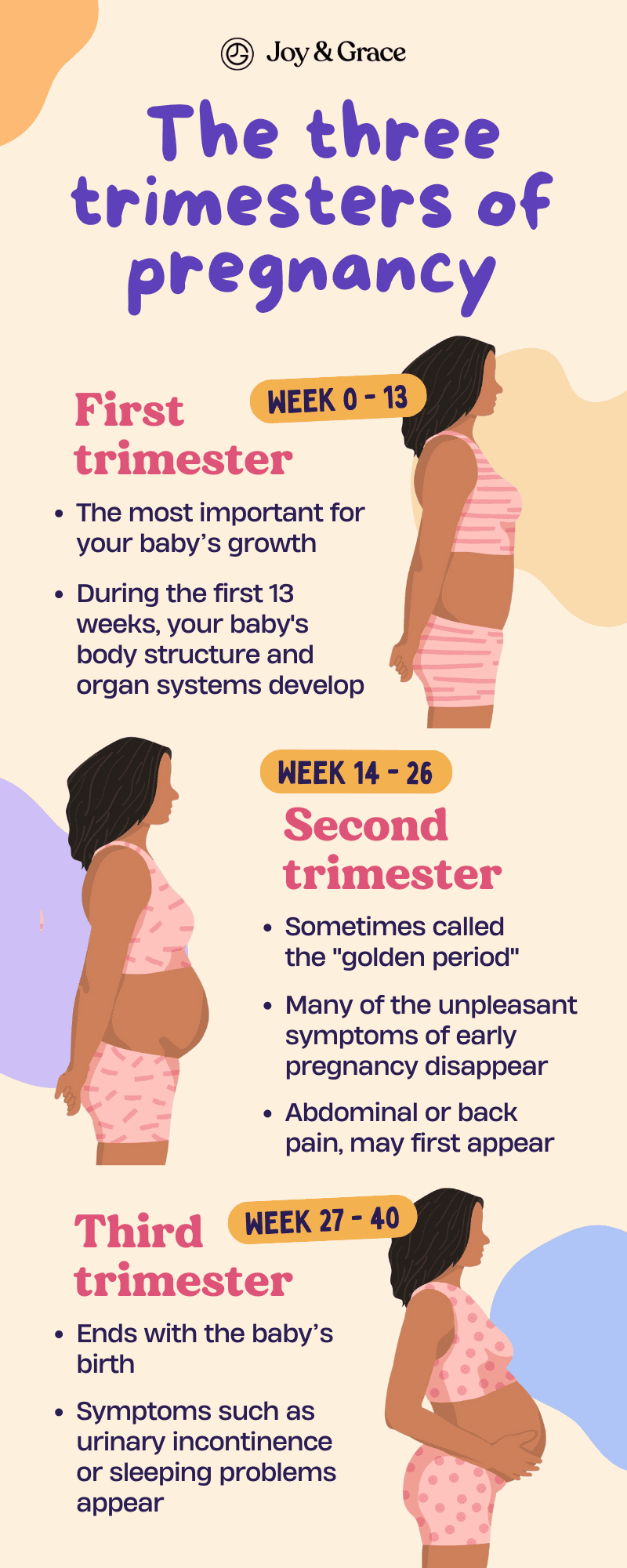
- First trimester (0 to 13 weeks of pregnancy). The first trimester is the most important for your baby’s growth. During the first 13 weeks, your baby's body structure and organ systems develop. Your body also undergoes significant changes during the first trimester. These changes often present with symptoms, including:
- Nausea,
- Fatigue,
- Breast tenderness, and
- Frequent urination.
- Second trimester (14 to 26 weeks of pregnancy). The second trimester is sometimes called the "golden period." This is because many of the unpleasant symptoms of early pregnancy disappear. Other symptoms, such as abdominal or back pain, may first appear. This is when you start feeling your baby’s first bumps and movements.
- Third trimester (27 to 40 weeks of pregnancy). The third trimester is the last stage of pregnancy. It ends with the baby’s birth. This is the period when the uterus dramatically increases in size. Because of the increase, symptoms such as urinary incontinence or sleeping problems appear.
Now it is time to get back to our topic.
So, what does pain in the shoulder mean?
Shoulder pain is one of the most common pain types worldwide. It can come as a result of many different diseases and conditions. Let us see the main causes of shoulder pain, specifically during pregnancy.
What Are the Causes of Shoulder Pain During Pregnancy?
There can be various reasons why pregnant women may experience shoulder pain.
They can happen in any of the three pregnancy stages. Some of the causes are generalized and milder. Others, like ectopic pregnancy or preeclampsia, can be more dangerous.
Let us discuss each of them and when they usually occur.
Hormonal Changes: Can Shoulder Pain Be Hormonal?
Throughout the pregnancy, the body produces a hormone called relaxin. Relaxin helps loosen the ligaments in the pelvic region. This is important as it makes the pelvis wider and readier for birth.
Relaxin does not only affect the pelvic ligaments. It also acts on the shoulder ligaments, making them lax and unstable. As a result, shoulder pain and discomfort may appear.
If you want further information: Relaxin is present in the blood even if not pregnant, although at much lower levels. In fact, relaxin receptors are also found in males!
A group of researchers conducted a study in 2016 to investigate the connection between relaxin hormone levels (when not pregnant) and shoulder problems.
The results showed that higher relaxin levels were associated with a greater likelihood of shoulder instability. Thus, the study suggests relaxin may play a role in developing shoulder problems.
Baby Growth and Position
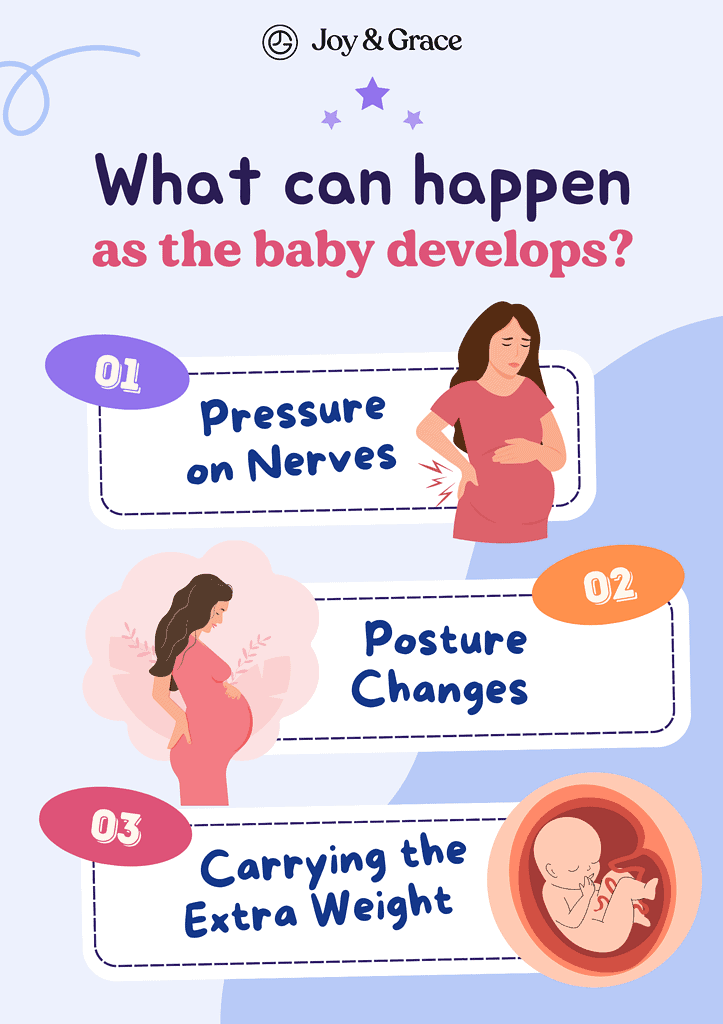
As the baby grows, the mother’s body shifts to accommodate the extra weight. It tries to make the baby’s stay in the uterus as cozy as possible. In order to achieve this, the mother’s body has to adjust and compromise its own stability. So, what exactly can happen as the baby develops?
Pressure on Nerves
A growing baby can put pressure on the nerves that run through the mother’s spine and into the arms and shoulders. This can cause pain, tingling, or numbness in the shoulders, arms, and hands.
Posture Changes
During pregnancy, the center of gravity moves forward with the increase in the baby’s weight. This movement gives rise to lumbar lordosis while the head and trunk go further back, causing an "S" body shape. This poor posture causes muscles to strain and become tense, causing shoulder pain and pain in other areas.
These changes impact the way the mother walks as well. Her body sways from side to side, and the legs are separated slightly more than normal.
Carrying the Extra Weight
A growing baby means a growing weight that the mother has to bear. As the baby grows, lifting objects can become more difficult. This can lead to shoulder pain, especially when the mother tries to carry heavy items.
Preexisting Shoulder Conditions
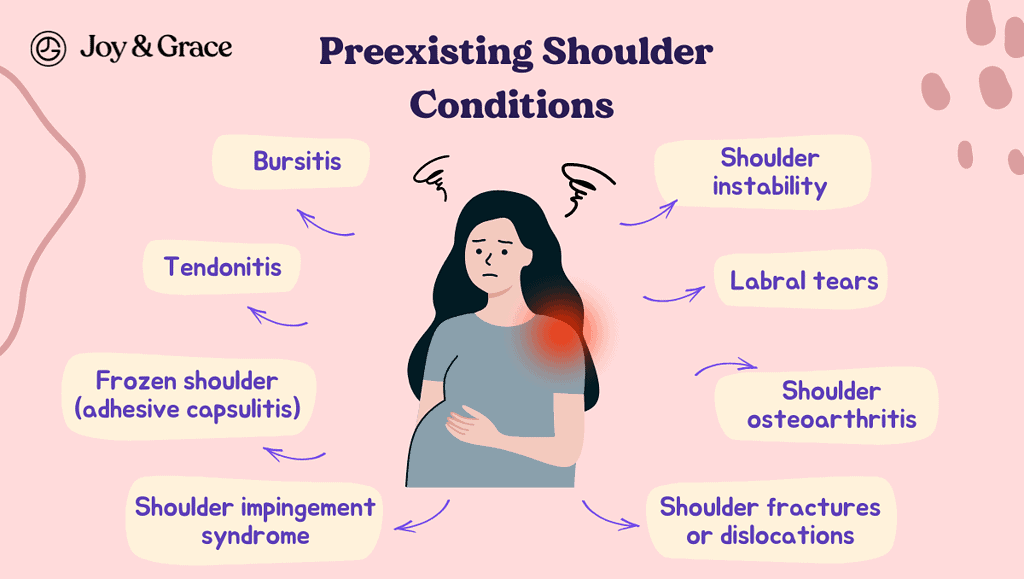
What do we mean by “preexisting conditions”? Preexisting shoulder conditions or diseases are those that existed before and continued during the time of pregnancy. These include:
- Bursitis: Inflammation of the bursa, a fluid-filled sac that cushions the shoulder joint.
- Tendonitis: Inflammation of the tendons in the shoulder, often caused by repetitive motion or overuse.
- Frozen shoulder (adhesive capsulitis): A condition characterized by stiffness and pain in the shoulder joint, making it difficult to move.
- Shoulder impingement syndrome: Compression or pinching of the rotator cuff tendons and bursa in the shoulder, leading to pain and limited mobility.
- Shoulder instability: A condition where the shoulder joint is prone to dislocation or subluxation, which can cause pain and instability.
- Labral tears: Damage or tears to the labrum, a piece of fibrocartilage that helps stabilize the shoulder joint.
- Shoulder osteoarthritis: Degenerative joint disease that affects the shoulder joint, causing pain, stiffness, and reduced range of motion.
- Shoulder fractures or dislocations: Previous injuries to the shoulder, such as fractures (broken bones) or dislocations, can contribute to ongoing shoulder pain.
The muscle strain during pregnancy may worsen the symptoms of these conditions. Thus, it may add to the shoulder pain.
Ectopic Pregnancy: How is Shoulder Pain Related to Ectopic Pregnancy?

Ectopic or “misplaced” pregnancy is a serious medical condition. It occurs in about 11 in 1,000 pregnancies.
Shoulder pain may seem like an unusual symptom of an ectopic pregnancy. But it does happen a fair amount of times. The type of shoulder pain in an ectopic pregnancy is known as referred pain. Referred pain occurs when a problem in one part of the body causes pain in another part of the body.
Shoulder pain is not the only symptom of ectopic pregnancy, though. Other symptoms may include:
- Vaginal bleeding,
- Lower tummy pain,
- Nausea, and
- Dizziness.
If you’re pregnant and your shoulder hurts without these other symptoms mentioned above, you probably don’t have an ectopic pregnancy.
Ectopic pregnancy is an urgent reason to visit your healthcare provider, as it may rupture. A ruptured ectopic pregnancy needs immediate surgery.
While you can't always stop an ectopic pregnancy, you can lower your risk by protecting yourself from STIs. Keep yourself safe by using a condom when you are not trying for a baby and by quitting smoking if you do.
Why Is Shoulder Pain a Symptom of Ectopic Pregnancy?
So, how does ectopic pregnancy cause shoulder pain? When an ectopic pregnancy occurs, the fertilized egg implants and grows outside the uterus. The new, abnormal implantation site is usually the fallopian tube, but it can also be the ovary, cervix, or abdomen.
As the egg grows, it becomes impossible for the abnormal site to sustain it. Consequently, the implanted egg may rupture. Because of the rupture, blood spills into the abdominal space. In most cases of ectopic pregnancy, the bleeding comes from a ruptured fallopian tube into the abdominal space.
When it spreads, the internal bleeding may irritate the diaphragm and the nerve that powers it, called the phrenic nerve.
The diaphragm is a muscle that separates the chest and abdominal cavity and is essential for breathing. When the diaphragm and phrenic nerve are irritated, a phenomenon known as shoulder tip pain may happen. This is due to the nerve extending all the way up to the shoulder.
When Does Shoulder Pain Start in Ectopic Pregnancy?
As we mentioned, shoulder pain occurs when the ectopic pregnancy ruptures. The signs of an ectopic pregnancy rupture begin during the first trimester, usually by the sixth week of pregnancy.
Which Side of the Shoulder Hurts With Ectopic Pregnancy?
Shoulder pain from an ectopic pregnancy can occur on either side of the shoulder. It is often located at the tip of the shoulder.
Shoulder tip pain is a sharp, stabbing pain at the top of the shoulders. It is often accompanied by difficulty breathing or shortness of breath.
This pain can be very uncomfortable and should not be ignored. We advise you to seek medical care right away.
Preeclampsia: What is Preeclampsia Shoulder Pain Like?
Preeclampsia is a condition that accounts for about 2-8% of pregnancy complications. It is characterized by high blood pressure and organ damage, most commonly in the liver and kidneys.
Shoulder pain is not one of the typical symptoms of preeclampsia. It can feel like a dull or sharp ache. You might even describe it as feeling like a knot or muscle tightness.
Suppose you do have preeclampsia and experience shoulder pain. In that case, you may also have the following symptoms:
- Blood pressure higher than 140/90 mmHg,
- Headaches,
- Pain in the upper right or left belly,
- Nausea and vomiting,
- Dizziness.
The cause of shoulder pain in preeclampsia is not fully understood. It is thought to be related to damage to blood vessels. Preeclampsia can cause blood vessels to narrow, leading to decreased blood flow to the affected areas. This lack of blood flow can cause pain and discomfort in the affected areas.
Where is Preeclampsia Shoulder Pain Located?
The damage that preeclampsia causes to the liver may make you experience an ache in the right upper part of your belly. Because of nearby nerve endings, this pain may spread or radiate to the shoulder.
Shoulder pain caused by preeclampsia is usually located at the top of the shoulder. The pain may be localized or may radiate down the arm and into the neck.
Should pain alone (without other symptoms) does not guarantee that you have preeclampsia. But it is a potential warning sign that should not be ignored.
Gallstones
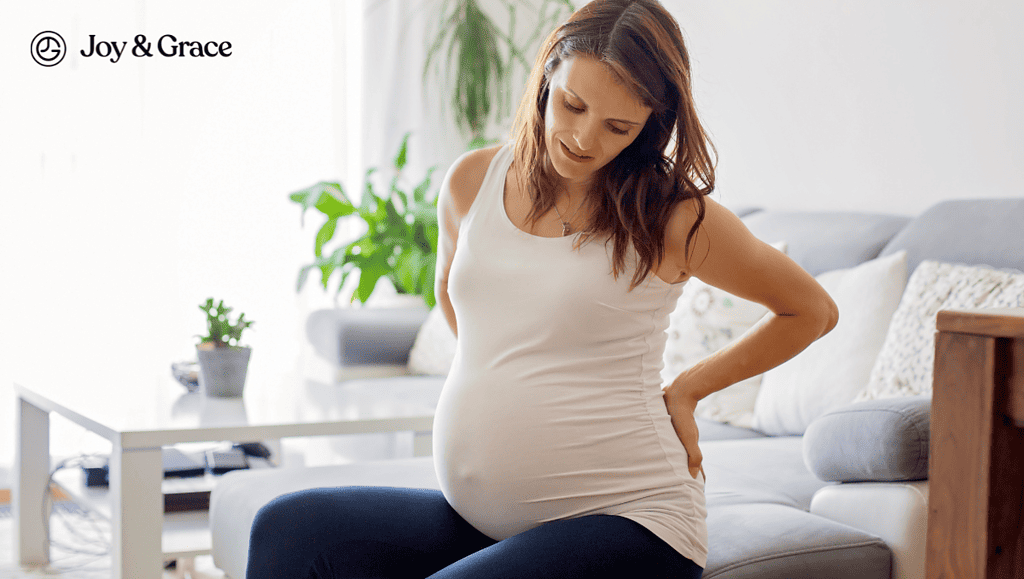
Gallstone disease is another possible cause of shoulder pain in pregnancy. The hormones produced during pregnancy increase the level of cholesterol in the body. An increased cholesterol level results in the formation of deposits or stones in the gall bladder.
Shoulder pain is one of the most common complaints of pregnant women undergoing gallstone disease. Other symptoms include the following:
- Pain in the right or left upper part of the belly,
- Nausea and vomiting,
- Icterus (skin and eyes becoming yellowish),
- Fever,
- Constipation.
Gallstones are present in about 8% of pregnancies. They are usually found in the third trimester. Rarely, pregnant women may need surgical medical treatment to remove gallstones altogether.
Miscarriage: Can Miscarriage Cause Shoulder Pain?
A miscarriage is the loss of a pregnancy during the first 20 weeks, so during the first and second trimesters. According to The American College of Obstetricians and Gynecologists (ACOG), it is the most common form of pregnancy loss.
Miscarriage can cause shoulder pain. But shoulder pain alone, without other signs, does not always confirm a miscarriage. If your shoulder hurts and you also feel dizzy, feverish, and have intense bleeding and abdominal pain, seek medical care immediately.
Here are the common signs and symptoms that may hint at a miscarriage:
- Cramping pain in your belly (like period pain)
- Dull ache in your lower back
- Vaginal bleeding, especially if the blood is red and the flow is heavy
- The presence of clots.
Postpartum Shoulder Pain
We know by now that shoulder pain may be a symptom during pregnancy. But does it also happen postpartum (after birth)? A 2015 study found neck and shoulder pain is very common after birth. The subjects were tested one month after giving birth. A higher risk of developing neck and shoulder pain after birth was associated with:
- A history of premenstrual syndrome (PMS),
- Anemia during pregnancy,
- Breastfeeding time, and
- Fatigue.
Is Shoulder Pain Common in Pregnancy?
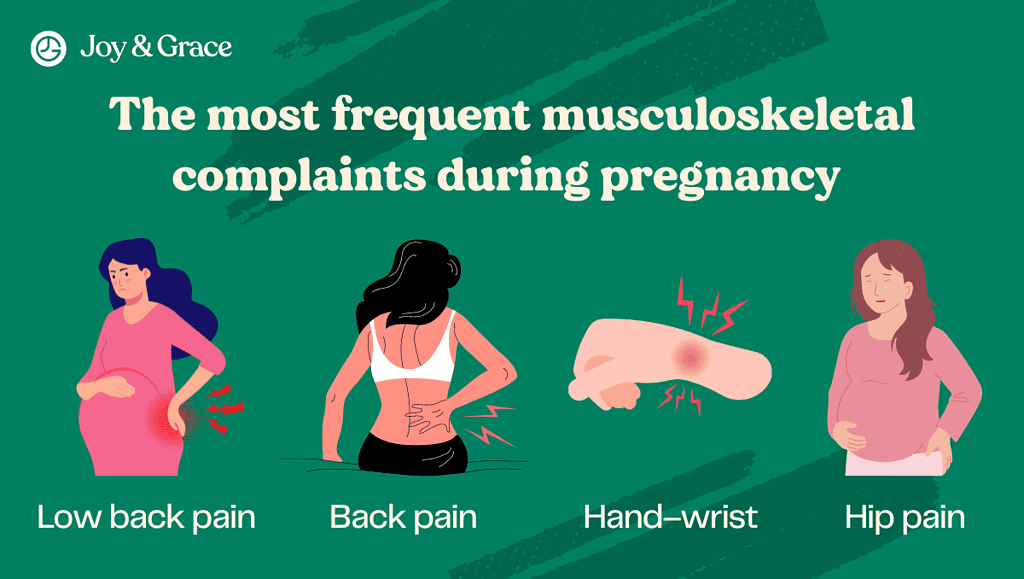
Shoulder pain in pregnancy is not very common compared to other joint pains.
A 2018 case study analyzed the main sites of musculoskeletal pain during the three trimesters of pregnancy. The study found that around 6-8% of the subjects experienced shoulder pain during pregnancy.
The most frequent musculoskeletal complaints during pregnancy were low back pain, back pain, hand-wrist pain, and hip pain.
Is Shoulder and Back Pain Normal in Early Pregnancy?
The answer to the question varies. Some women might experience shoulder and back pains during any of the three pregnancy trimesters.
The weight and pressure of the baby can lead to more strain on the spine than before the pregnancy. This might be why the mother’s body responds with new aches and discomfort. It is simply trying to adjust to the new reality.
Back pain and low back pain are common complaints during pregnancy. They get more pronounced as the pregnancy develops. These types of pain achieve their highest prevalence in the third trimester.
Shoulder and back pains without any other symptoms do not usually raise suspicion of anything serious going on. But this does not always mean they are normal pregnancy symptoms.
We suggest you communicate with a medical professional to determine whether the pain is normal or worrisome. They can prescribe appropriate treatments or therapies to relieve the pain. Staying active, practicing good posture, and doing prenatal exercise can work wonders.
Is Neck and Shoulder Pain Common in Pregnancy?
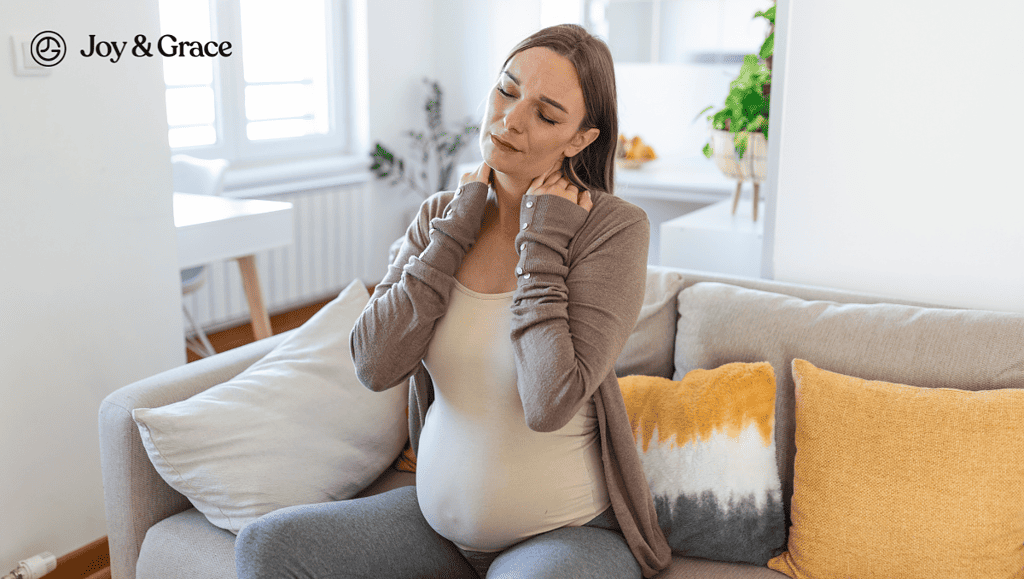
We mentioned back pain as a type of pain that may accompany shoulder pain during pregnancy. Well, there is also neck pain. Neck pain is a slightly more frequent complaint of pregnant women than shoulder pain.
According to a study, neck pain affects around 12% of pregnant women. Do not hesitate to address any neck and shoulder pain that may arise during your pregnancy.
Is Shoulder Tip Pain Normal in Pregnancy?
No, usually not. Shoulder tip pain in pregnancy is an atypical type of pain located where your shoulder ends and your arm begins. Its exact cause has yet to be discovered. As we mentioned earlier, it may come from nerve irritation of the diaphragm muscle after ectopic pregnancy rupture. Right shoulder tip pain can also appear in mothers after a Cesarean section (C-section).
When it is isolated, without other symptoms and signs, this type of pain may not indicate anything serious.
Still, if you experience shoulder tip pain, it would be wise to contact your doctor anyway.
How to Deal With Shoulder Pain During Pregnancy?
If you have ever had a baby, you know that going through so many changes in a short time is difficult. Add shoulder pain to those changes, and you have got yourself quite the challenge. So, what can you do to get rid of shoulder pain and other pain types during pregnancy? Let us find below.
What Helps Neck and Shoulder Pain During Pregnancy?

Here is what you can do to ease neck and shoulder pain as quickly as possible:
Improve Posture
As we explained, pregnancy can lead to a change in posture. This is because the difference in the center of gravity causes shoulders to sag. As a result, shoulder pain occurs.
Try to stand up straight as often as possible, and do not slouch. Avoid standing or sitting in the same position for an extended period. Change your position any time you feel uncomfortable.
Regular Exercise and Physical Therapy
Regular exercise and physical therapy are safe in most healthy pregnancies and may help reduce shoulder pain during pregnancy. Light activities like swimming and yoga can help strengthen the muscles around the shoulder and reduce discomfort. These exercises must be performed at an optimal level to keep both the mother and the baby safe.
Heat Therapy
Heat therapy is a handy way to deal with shoulder pain during pregnancy. Applying heat to the affected area can help improve blood circulation and relax the shoulder and neck muscles. A warm shower, hot water bottle, or heating pad can be beneficial.
Cold Therapy
If heat therapy does not work, cold therapy may help reduce pain and inflammation. Applying an ice pack, cold compress, or cloth to the affected area can numb the pain and reduce swelling.
Massage Therapy
Massage therapy can help reduce shoulder pain during pregnancy. A massage therapist can work on the muscles around the shoulder to relieve tension and reduce pain. You can also work with a partner or use a foam roller to get relief.
Your doctor may prescribe painkillers for shoulder pain during pregnancy only in special cases. This 2022 study argues against using painkillers during pregnancy. It argues there is insufficient evidence to support their safety.
Paracetamol is generally a safe pain medication. But it should still be used with caution.
Note: As we discussed, shoulder pain in pregnancy may be caused by a dangerous condition, such as ectopic pregnancy or preeclampsia. This is why it is important to always refer to your doctor to establish a correct diagnosis. A correct diagnosis will lead to receiving the right treatment. To pinpoint where the problem is, your doctor will:
- Ask you about your medical history and pregnancy
- Perform physical examinations
- Order imaging and lab tests
How to Prevent Shoulder Pain During Pregnancy?
Shoulder pain is a common problem that may continue for years. In half of the people affected, it goes away within six months.
So, what can you do to prevent shoulder pain during pregnancy? Try the following tips:
- Keep a good posture.
- Rest whenever you need to.
- Do not overuse your shoulder.
- Do not carry heavy objects.
- Try to keep a healthy weight. This can be achieved by increasing water in your diet and cutting foods rich in salt and fats.
- Check your blood pressure regularly.
- Reach out to your doctor anytime you worry or suspect an underlying problem.
Takeaway
Shoulder pain is a possible symptom of pregnancy.
Pregnancy, as a whole, normally lasts about 40 weeks and can be separated into three stages called trimesters.
Relaxin is a hormone produced throughout the pregnancy. It may cause shoulder pain by making shoulder ligaments weak and lax.
The baby’s growth and position may change the mother’s posture and pressure her nerves.
Ectopic pregnancy is a misplaced pregnancy. This misplacement is usually located in the fallopian tubes. The rupture of the misplaced egg causes bleeding. Bleeding may spread, reaching distant nerves and causing shoulder pain.
Preeclampsia is a dangerous condition during pregnancy. It is characterized by high blood pressure and organ damage. Damage to organs and the blood vessels may lead to referred shoulder pain.
Shoulder pain is a symptom in 6–8% of pregnancies. It is less common than other musculoskeletal pain types, such as back or neck pain.
Shoulder tip pain is an atypical pain. It appears in women who have undergone birth by C-section.
Various methods exist to treat and prevent shoulder pain, even at home. These include lifestyle changes, diet changes, and complementary therapies. Medications are generally not suggested.
It is important to refer to your health care provider to establish a correct diagnosis. A correct diagnosis will lead to getting the right treatment. To pinpoint where the problem is, your doctor will:
- Ask you about your medical history and pregnancy,
- Perform physical examinations,
- Order imaging and lab tests.











